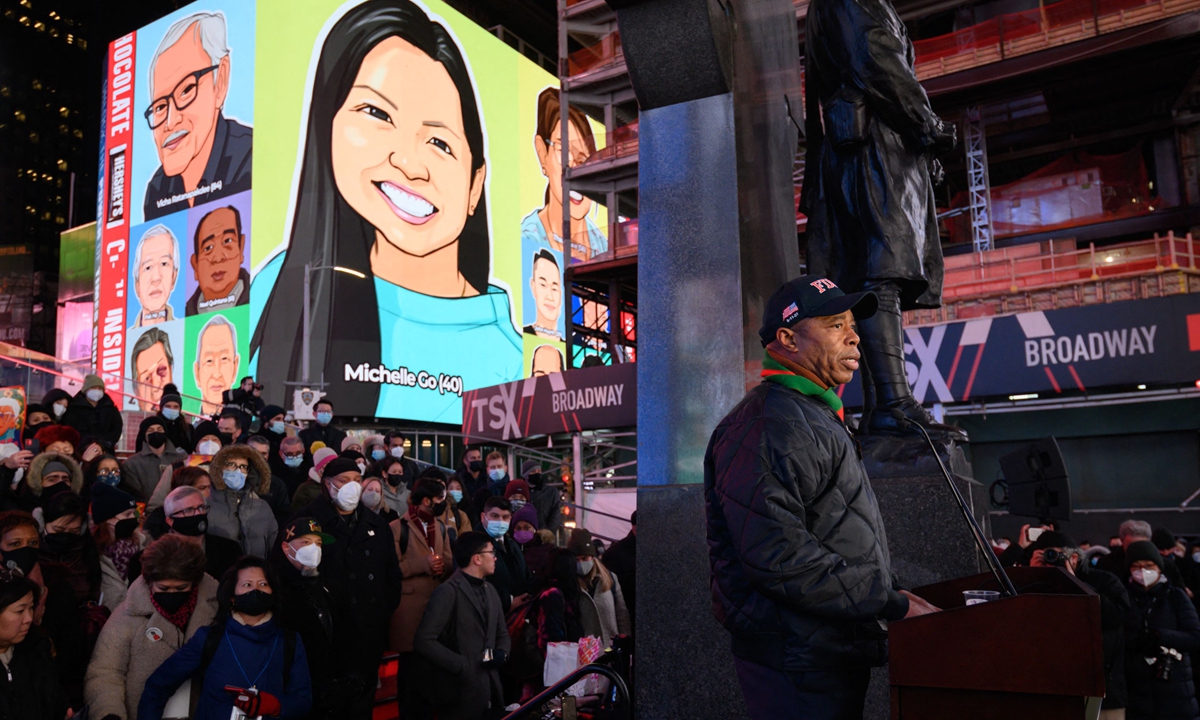Recently, a malicious smear campaign against China on Russia-Ukraine issues surfaced on overseas social media - the "Great Translation Movement."
The participants of the movement focus their efforts on extracting niche and radical comments from the Chinese internet and translating them into multiple languages, colluding with other anti-China forces and claiming to show foreigners the "true face" of Chinese netizens.
However, the image of China and Chinese people in their depiction has been arrogant, populist, cruel and bloodthirsty, forcibly presented by them to the world through the use of various pejorative terms.
What kind of people are behind the "Great Translation Movement"? Why do they see only hatred and negative messages from Chinese internet in their eyes? What do they hope to achieve by spreading such messages disproportionately?

Photo: VCG
Spreading cherry-picked contentOn the back of the Russia-Ukraine conflict, the "Great Translation Movement" has come into public view, which was started by ChongLangTV, a Chinese-language community with around 53,000 members on overseas social media platform Reddit.
Starting from February, ChonglangTV began hyping up the topics reflecting "China's ugly face" in Ukraine crisis, including amplifying statements such as the rumor "China will 'import' fleeing Ukrainian beauties," and tone-deaf comments that were made by a very small number of netizens and were widely condemned by the large majority of Chinese netizens.
ChonglangTV members mainly looked for and translated some radical views on the Russia-Ukraine conflict from Chinese social media platforms into English, and reposted them in the form of pictures juxtaposing the "original text" and the English translation. These crude translations have been echoed by many anti-Chinese media outlets and NGOs, such as SupChina and Radio Free Asia.
As the compilation of sensational and eye-catching topics gained greater attention, members of the ChongLangTV even started to engage in personal data search activities, publicly spreading the personal information of people they dislike in private conversations on the internet.
On March 2, ChongLangTV was disbanded by Reddit for flagrantly violating the privacy of others.
The Global Times found that @TGTM_Official, a major account for the movement on Twitter, had attracted more than 17,000 followers as of March 24. The coverage they "translated" has expanded to various controversial topics, like provoking argument over the origin of pickles between Chinese and South Korean netizens.
After its creation, @TGTM_Official received a lot of criticism and complaints lodged against them by netizens. However, the main participants have continued to present themselves to the public as victims, arguing that they only translate information from the Chinese internet and are not advocates for such opinions.
A post on the account @TGTM_Official on March 19, for example, said that "without China's support to Russia, there [wouldn't] be war, let alone anything thereafter to make things up." In another post on the account of @cnintranslation on March 6, there were screenshots and claims that the Chinese government reportedly rewarded 1,000 yuan ($157) for information leading to the arrest of people who donated money to Ukraine.
However, the Global Times found no such report on the issue or the screenshot shown in the post on Chinese social media platforms. To the contrary, the Chinese government has sent batches of humanitarian aid to Ukraine for the ordinary people, including food, sleeping bags, and moisture-proof pads.
However, after combing through their posts, the Global Times found that they were not the case.
"The so-called great translation movement is just a farce," Wang Qiang, a research fellow at the Center for the Study of Military Operations Other Than War of the PLA National Defense University, said.
Wang noted that the rise of the movement also reflects that the anti-China forces' public opinion offensive has undergone certain changes.
"Previously, opinion warfare against China tried to translate English content into Chinese to spread Western political ideas into China. But now the movement is to incite hatred toward China in other countries by spreading hand-picked Chinese content," Wamg told the Global Times.
Seeking feigned Western recognitionBy scanning through hundreds of Twitter posts under the hashtags #GreatTranslationMovement, the Global Times found that many of the users active in posting and forwarding tweets are Chinese immigrants who left China for Western countries in previous years.
With years or decades of fairly decent lives overseas, some of the immigrants think of themselves as "elite Chinese," and this delusional superiority complex makes them blindly look down upon their motherland and their compatriots, said Chinese media experts.
Yang Han, for instance, a core participant in the "translation movement," is a self-proclaimed political observer currently living in Sydney.
Yang's name is frequently seen in the China-related coverage in Western media as "an Australian political commentator of Chinese descent," who often criticizes China on a plethora of topics from human rights to the Taiwan question with groundless accusations. According to Deutsche Welle, Yang had been busying himself with translating extreme forms of speech related to the Ukraine crisis from a private online chat group into English since the conflict began.
Many members of this private chat group are Chinese Australians, Yang told Deutsche Welle. Yang said that he translated and posted their comments to expose their "pro-Russian speech," as he thought these people were "misled" by "official Russian and Chinese media."

A vigil is held in Times Square, New York on January 18, 2022 in honor of Michelle Go, who was killed after being pushed onto subway tracks on January 15. Anti-Asian hate has been on the rise. Photo: VCG
Wenhao, a US-based Chinese journalist and anchor of the Chinese version of VOA, the infamous American propaganda machine funded by the US Congress, has also been active in the"translation movement."
The topics covered in his reports, to serve the outlet, have always focused on smearing China.
Even before the Twitter account of the movement was established, Wenhao had introduced it by saying "users are posting translations of nationalistic posts from China's social media that are supportive of Russia, wars, violence, and anti-Semitism."
As part of the supposed "elite Chinese" class, their influence, backed by anti-China Western media, is undoubtedly huge. Their collusion with anti-Chinese forces has become the capital for them to be looked up to by other ignorant participants.
On the social media platform Reddit, some ChongLangTV members cheered for Yang being interviewed by Western media outlets. Reddit user "Nyanko" shared the Deutsche Welle's March 12 article on the same day, calling for more people to join the "movement." "Nyanko" is a core member of ChongLangTV, which regards being covered by foreign media as the group's goal.
Fueling racism against Asians"Recently, the 'Great Translation Movement' has been appearing more frequently in several WeChat groups of Chinese Americans. Most people of Chinese ethnicity are angry when they see what they are doing," Tang Enyang, a New York resident and a naturalized American citizen for over 20 years, told the Global Times.
Tang noted that for people of Chinese descent overseas, there are scattered acquaintances who, for various reasons, hate their native country, either because of their fragile pride, who cannot view the achievements nor temporary problems in China's development in an unbiased way, as if the worse China is, the more it affirms their belief that leaving China was the right thing to do; or because they were brainwashed by a relatively distorted value, obsessively reinforcing time-worn misconceptions about China as "undemocratic" and "lacking in freedom."
A few Chinese who actively participated in the "Great Translation Movement" take advantage of their Chinese identity to feed Western media with China-bashing content, but they should not be taken as representatives of Chinese people overseas, Lü Xiang, a research fellow at the Chinese Academy of Social Sciences, said. Overseas Chinese people in fact have various opinions and most of them, who have earned a stable job and social status in Western societies, would not agree with such narrow and biased opinions against China, Lü said.
However, it is undeniable that this movement not only gradually cozied up to anti-China forces, but also brought about varying negative impacts on the lives of Chinese living in the West.
In February, for example, an Asian woman was killed in a stabbing incident in an apartment in Manhattan after being followed home by a 25-year-old man, said USA Today on February 14. One month earlier, a 40-year-old Asian woman was pushed to her death in front of an oncoming train in New York City, reported NBC.
Ironically, in the interview with Deutsche Welle, members of the ChongLangTV said they did not believe their actions would exacerbate hate crimes, "because people in the civilized world are capable of logical thought and separate individuals from groups," they asserted.
"They view China and Chinese people with a pathological mindset. Another motive of this group to pick up the mantle of such anti-China movements is that they want to earn benefits for themselves from anti-China governments and forces; green cards for example, or to gain acceptance in foreign societies," Li Haidong, a professor from the Institute of International Relations at the China Foreign Affairs University in Beijing, told the Global Times.
These people's movements will lead to further biased and negative public opinions toward China, Li said.
"Translation should be a bridge for communication between people using different languages and from different cultures. Using it as a tool to incite antagonism and hatred runs counter to the history of intercommunication between different civilizations," Wang said.
In response, Wang suggested enhancing official communications with the external world, including diplomatic and civil exchanges, using data and facts and well-told Chinese stories to counter the movement.





